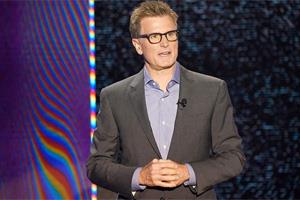The end times are nigh. “Oh, there will be a reckoning!” they say.
But wait.
“Reports of television’s death are greatly exaggerated,” say others.
So which is it?
The Bible tells us, “This world is hearing and seeing the last warning message from God. Multitudes, multitudes in the valley of decision; for the day of the Lord is near in the valley of decision!" (Joel 3:14).
Oh, and Game of Thrones (top) won’t return until 2019.
In a strange twist unique to the modern age, the technological side of TV has become easy to guess. It’s on the content side where the future of TV is suddenly hard to predict.

First, judging by everyone from Forbes to AdWeek, the near-term future of TV technology involves more streaming, with more and more ads, and more targeted ads, to help pay for everything. The buzz phrase of the moment, according to eMarketer, is “connected TV advertising”: Internet-delivered content viewed on a TV screen. If the experts are right — and when are they ever wrong? — you will see more ads on Hulu, YouTube TV, and other streaming services. The experts say these ads will come with a silver lining. You won’t see the same ad over and over again, they insist, on a 12- to 15-minute cycle, as with conventional network broadcasting. I don’t quite see how this works personally: To my way of thinking, more and more ads definitely means the same ad over and over again. Unless the number and variety of different advertisers jump markedly. Which seems unlikely. Or as unlikely, anyway, as the final truth being finally revealed on The X-Files (right).
But wait, there’s more. The experts say social media programming will expand dramatically in 2018, perhaps even exponentially. “I want my MTV” is so 1985. Facebook, Twitter, and Snapchat will join Apple, Hulu, Amazon, and YouTube TV in trying to grab millennials’ attention. Cord-cutting is not cord-cutting if the target audience was never connected by a cord in the first place.
And as advertisers will tell you, millennials — i.e., younger viewers, in general — are the most sought-after demographic because they aren’t set in their ways yet. They haven’t decided their brand preferences yet. Everything is in motion, in a state of flux. Yesterday’s Wonder Bread is today’s avocado toast.
No less an expert than Consumer Reports has predicted that 2018-‘19 will see more 4K TVs with HDR, complete with digital voice assistants. Siri is migrating to the home set.
Size will matter than ever before. The new standard in HDTV is likely to be 65- to 75-inch sets, according to Consumer Reports, in part because prices keep coming down. “Quantum dots” are the new “OLED TV” (easy-speak for “Organic Light-Emitting Diode,” which only a year ago was being promoted as the Next Big Thing in digital display TV sets). The major selling point behind both OLED and quantum dots is it allows the consumer to get truly dark black levels from an ultra-thin screen, while at the same time making the TV more power-efficient and eco-friendly.
Those who warn of a reckoning point to the digital world’s ever more crowded space, which was already crowded in the first place by Netflix. If Netflix offers enough on its own, both in terms of quantity and quality — the HBO model for the 21st century — would you really want or need Hulu, Amazon, and DirecTV, let alone Twitter TV, Facebook TV, and YouTube?
It’s content where things get interesting, though. Content is still king. And while technology is grand and ever-changing, it’s the shows themselves that pique viewers’ interest. It’s why TV Worth Watching is named what it is, and why HBO continues to be the industry leader, despite the competition. Game of Thrones is a prime example, as The Sopranos (above) was before it. Guessing where the next Game of Thrones will come from is the hard part. If it were easy, every network — pay-TV, premium-cable, or broadcast — would be doing it.
CBS, which has dominated the mass-audience TV market for what seems like decades, thanks to user-friendly sitcoms like The Big Bang Theory and countless spin-offs of NCIS and CSI, has opted for nostalgia with an updated, modern twist: New versions of MacGyver and Hawaii Five-0 and, just announced, Murphy Brown (above). ABC has swung hard behind superhero dramas, NBC resurrected Will & Grace, and Fox has tried to breathe new life into The X-Files, Prison Break, and 24, with mixed results.
HBO is not above cashing in on past successes: One of TV content’s big mysteries moving forward is not if but when HBO will green-light a sequel and/or spin-off to Game of Thrones. (A spin-off or sequel to The Leftovers may be a little longer in coming, and who knows if Westworld will lead to Futureworld further down the road.)
It’s worth noting that, The Sopranos aside — HBO’s signature series from 1999-2007 — the one hard-hitting drama that ushered in the new age of cable supremacy over the traditional broadcast networks, where younger, educated, more demanding viewers were concerned, was The Shield.

Could The Shield stand out in today’s crowded digital universe, TVWW asked Turner Entertainment and TBS and TNT president Kevin Reilly (left), at last summer’s gathering of the Television Critics Association in Beverly Hills. Reilly was the executive at FX Networks in 2002 who, perhaps more than anyone else, shepherded The Shield into being.? “It would have worked; it would have been the same great show,” Reilly replied. “But no, I don't think that's possible again. I don't think The Walking Dead is possible again. There's always going to be something, always, that rises to the top of the culture. But that moment in time, that galvanization, that singular moment that becomes Cheers or The Shield in its own right, no. I don't lament things I can't change. Yes, it is unfortunate, but think about the nature of stardom today and sustaining things. You asked about who's going to thrive in 30 years. There will be people who endure. There will be things that endure. But that singular moment — I mean, that moment, for me, of The Shield in my career, to have gone to the Emmys and told Michael Chiklis, ‘Look’ when he got up for the Emmy, and he looked at me and I said, ‘Just go with it’ — it was a crazy moment in time, that that show came out of nowhere. I was told at the time that if we did a 1 rating, that would be dreaming, just a 1 would be amazing, and we did a 4 rating and broke the cable record. It's not going to happen.
“Even if it did, unfortunately, it is in a sea of many, many other shows. That's the game we're in. I think it's to the consumer's benefit, it’s to your benefit because it’s a feast of greatness. I'm proud to be part of this industry, in that sense.”
I have seen the future, and it includes new episodes of Westworld and Game of Thrones.
After that, it’s anyone’s guess.